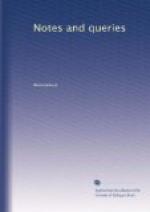of licensing, and likewise in the service of the House
and the army, he requested that he might be continued
in the said place of licenser. (Lords’ Journals,
ix. 457.) Gilbert Mabbott was accordingly appointed
licenser of such weekly papers as should be printed,
but resigned the situation 22nd May, 1649. (Commons’
Journals, vi. 214.) It seems he had conscientious
objections to the service, for elsewhere it is recorded,
under the same date, “Upon Mr. Mabbott’s
desire and reasons against licensing of books to be
printed, he was discharged of that imployment.”
(Whitelock’s Memorials, 389.) On the
20th September, 1649, was passed a parliamentary ordinance
prohibiting printing elsewhere than in London, the
two Universities, York, and Finsbury, without the
licence of the Council of State (Scobell’s Ordinances,
Part ii. 90.); and on the 7th January, 1652-3, the
Parliament passed another ordinance for the suppression
of unlicensed and scandalous books. (Scobell’s
Ordinances, Part ii. 231.) In 1661 a bill for
the regulation of printing passed the Lords, but was
rejected by the Commons on account of the peers having
inserted a clause exempting their own houses from
search; but in 1662 was passed the statute 13 & 14
Car. II. c. 33., which required all books to
be licensed as follows:—Law books by the
Lord Chancellor, or one of the Chief Justices, or
Chief Baron; books of history and state, by one of
the Secretaries of State; of heraldry, by the Earl
Marshal, or the King-at-Arms; of divinity, physic,
philosophy, or whatsoever other science or art, by
the Archbishop of Canterbury or the Bishop of London:
or if printed at either University, by the chancellor
thereof. The number of master printers (exclusive
of the king’s printers and the printers of the
Universities) was to be reduced to twenty, and then
vacancies were to be filled up by the Archbishop of
Canterbury and Bishop of London, and printing was
not to be allowed elsewhere than in London, York (where
the Archbishop of York was to license all books), {427}
and the two Universities. This Act was to continue
for two years, from 10th June, 1662. It was renewed
by the 16 Car. II. c. 8.; 16 & 17 Car. II.
c. 7.; and 17 Car. II. c. 4., and expired on
the 26th May, 1679,—a day rendered ever
memorable by the passing of the Habeas Corpus Act:
but in less than a year afterwards the judges unanimously
advised the king that he might by law prohibit the
printing and publishing of all news-books and pamphlets
of news not licensed by His Majesty’s authority;
and accordingly on the 17th May, 1680, appeared in
the Gazette a proclamation restraining the
printing of such books and pamphlets without license.
The Act of 1662 was revived for seven years, from
24th June, 1685, by 1 Jac. II. c. 17. s. 15.,
and, even after the Revolution, was continued for a
year longer by 4 & 5 Wm. and Mary, c. 24. s. 14.
When that year expired, the press of England became
free; but on the 1st of April, 1697, the House of Commons,




